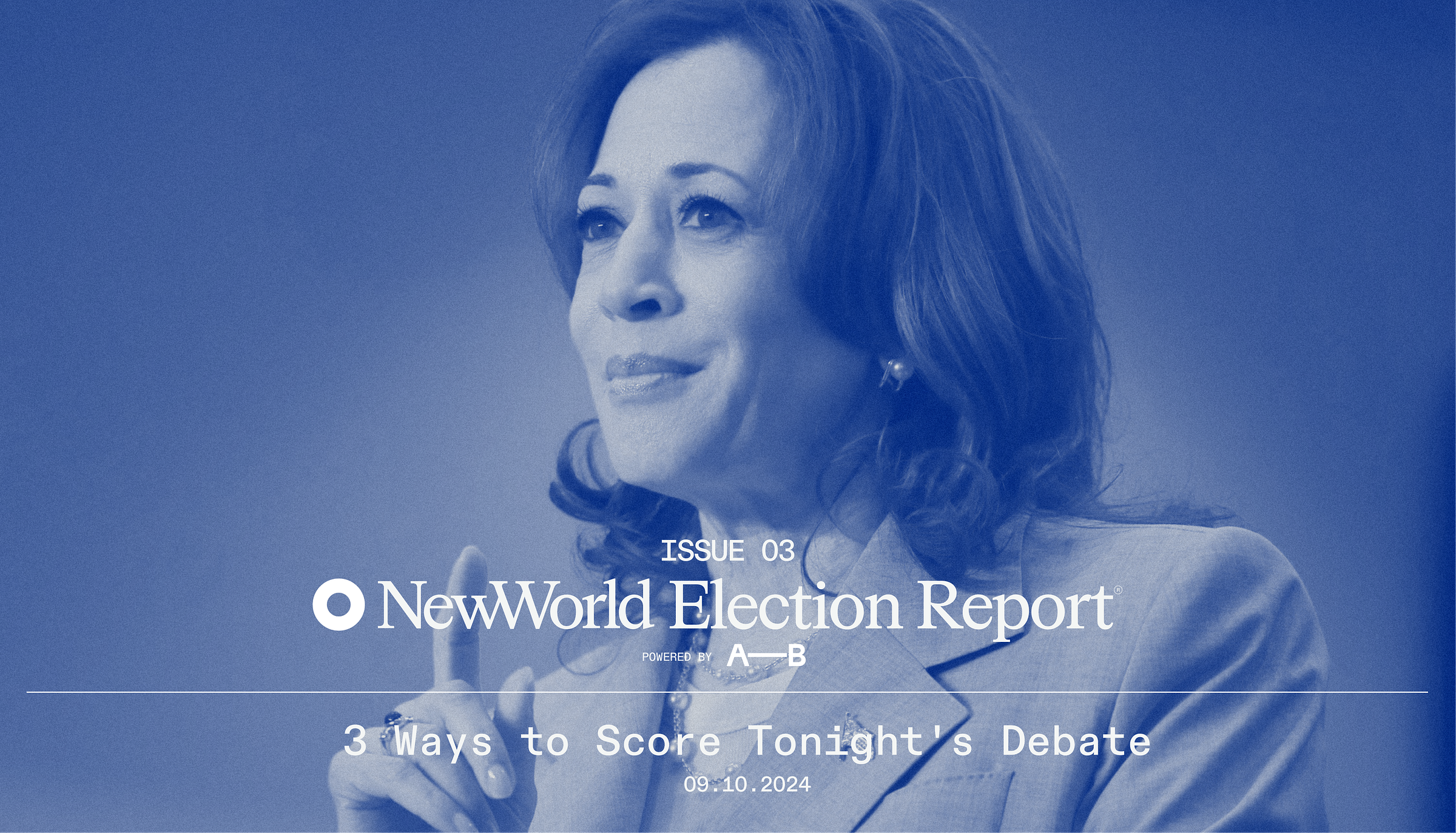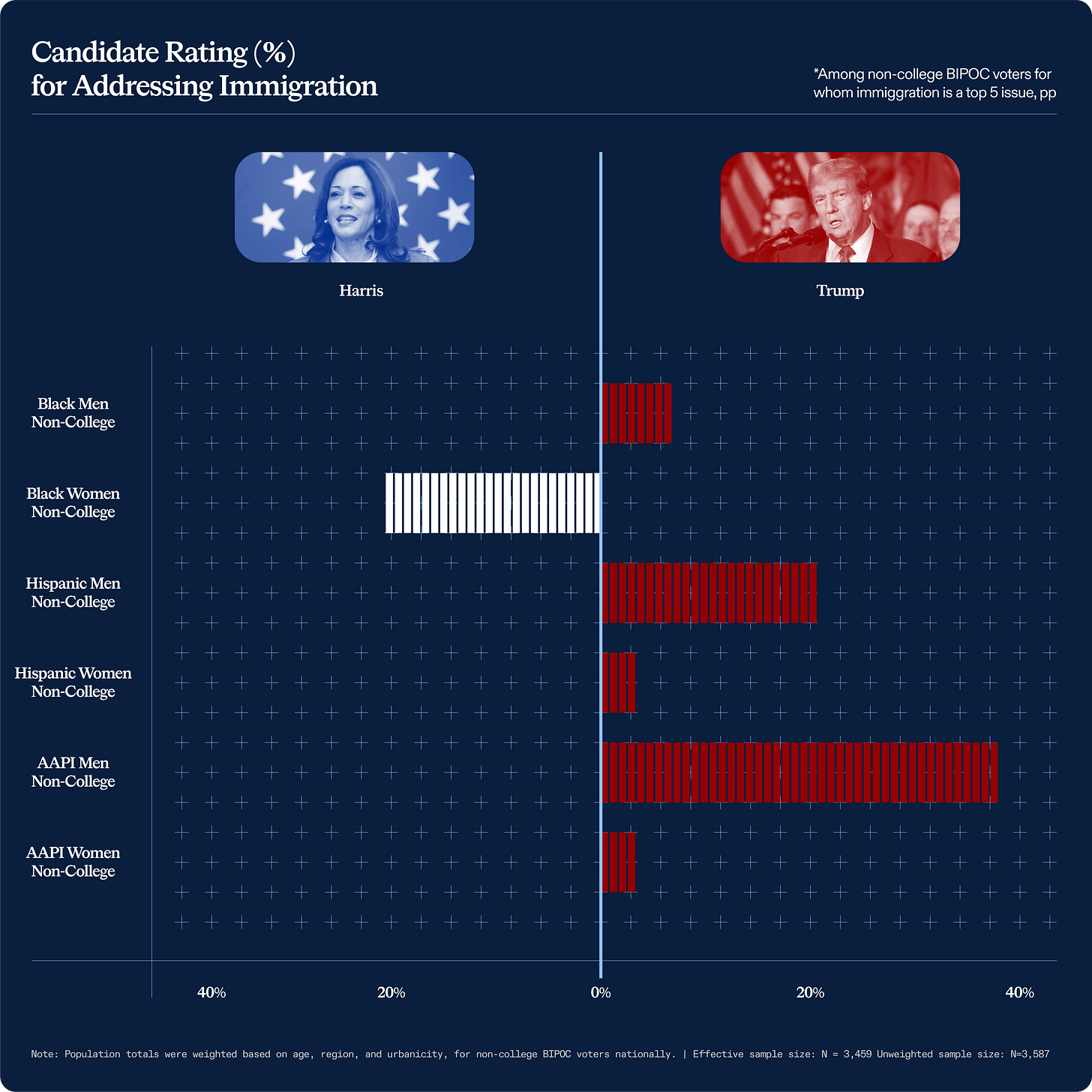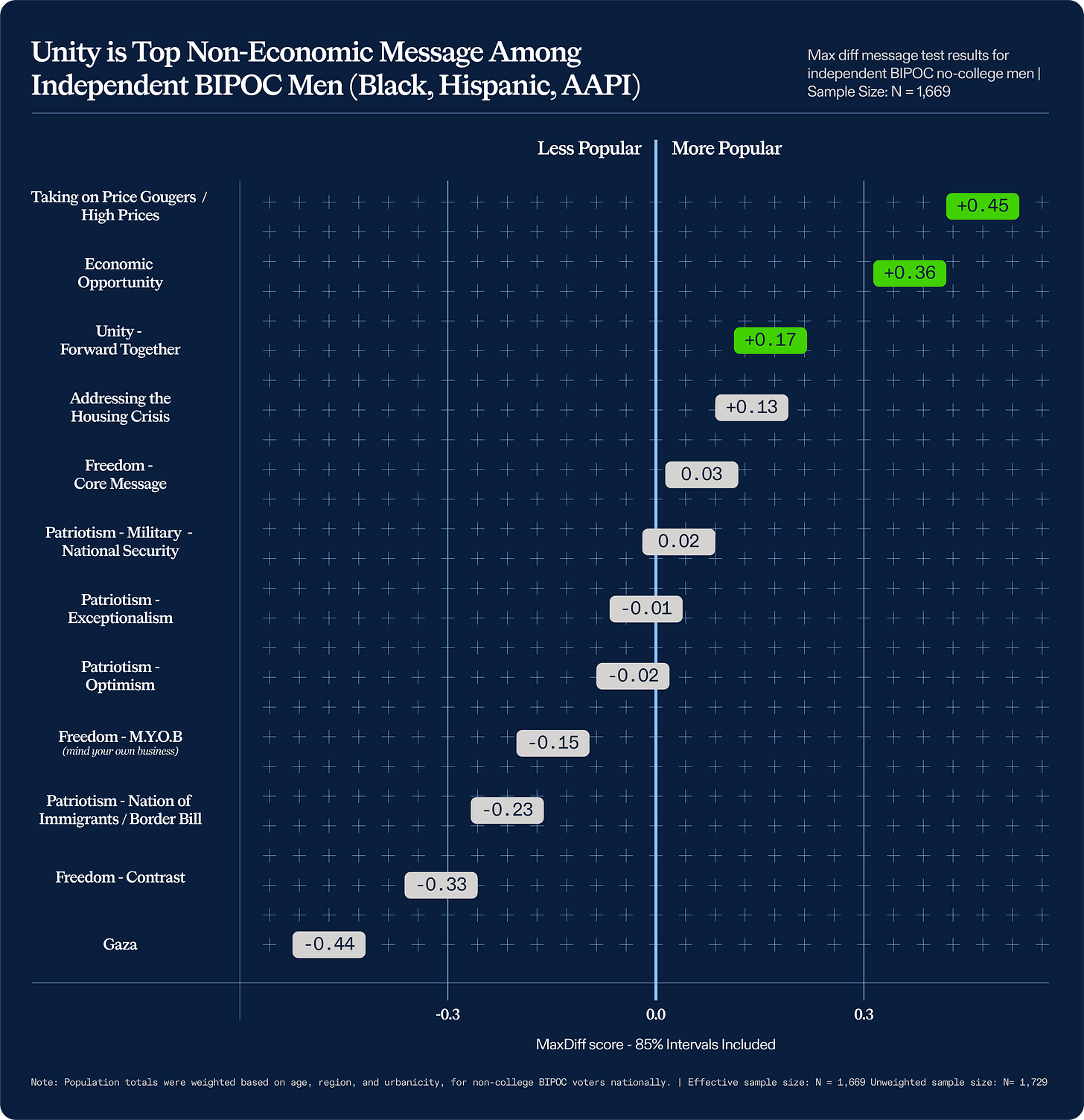As we approach one of the most anticipated debates of the year, our latest tracking polls and message tests of BIPOC voters without a college degree reveal an opportunity for Vice President Kamala Harris to connect with these critical segments of the electorate. With an expected audience of 60 million and early voting already starting, this debate is a pivotal moment. Here’s what to watch for:
Can VP Harris define herself as a populist fighter, not a liberal elite?
Despite her working class upbringing, strong support for unions, and the Biden administration’s populist economic policies, our research shows she has yet to convince significant segments of voters of color without a college degree that she’s a true fighter for working Americans.
Who Needs to See The VP be “McBelievable”:
AAPI and Latina women: This week, 27% of AAPI women and 10% of Hispanic women we surveyed said they don’t know if Harris cares about people like them.
Black voters: 29% of Black men and 24% of Black women aren’t convinced Harris cares about people like them, despite showing a higher rate of overall support for Harris compared to other groups.
Men of Color: A striking 30% of AAPI men and 32% of Hispanic men see VP Harris as representing elites, and only 47% of AAPI men, 50% of Hispanic men, and 59% of Black men perceive Harris as a champion of the middle class.
How She Can Be “McBelievable”:
Harris must directly address this perception gap by clearly defining who she’s fighting for—especially as 57% of Hispanic women and 45% of Black women cite financial hardship as a major concern. A key narrative around middle-class support and improving the lives of working people could resonate deeply. **All BIPOC voting groups polled were without a college degree.
Harris needs to emphasize her policies for economic mobility, labor rights, and community investment. If she successfully connects with working-class voters of color, particularly those unsure about her, it could be a game-changer.
Can VP Harris successfully rebut Trump on the attacks that hurt her with voters of color?
Trump’s attacks on Harris have gained traction with non-college BIPOC voters, particularly on issues of inflation, immigration, and her overall effectiveness. Harris has to push back against these narratives with sharp, validated responses that speak directly to the concerns of working-class voters.
Who Needs to See The VP “Clapback”:
Latino and AAPI men on immigration: Trump holds a narrow edge over Harris on immigration among Hispanic men (+4) and AAPI men (+15). The gap is much wider among those Hispanic men (+21) and AAPI men (+37) for whom immigration is a top issue.
Latine and AAPI voters on inflation: The inflation issue is especially concerning for Harris, with AAPI men (+6) and Hispanic men (+5) favoring Trump on this front. Among women, her advantage on inflation is better but still modest for AAPI women (+16) and Hispanic women (+18).
How She Can “Clapback”:
Harris must deliver strong responses to Trump’s attacks on inflation and immigration. Watch how she reframes these issues to emphasize her role as a labor champion and advocate for affordable living.
With so many voters still saying they don’t know enough about VP Harris, we’ll also be looking for her to forcefully challenge Trump’s argument that she’s responsible for rising costs and economic strain. She should lean into specific solutions like addressing price gouging and expanding union rights, which could sway a significant portion of undecided Hispanic and AAPI men while supercharging her support with Black women who our survey shows are the most excited about progressive economic policies.
Can VP Harris project the presidential aura of change and unity that voters want?
Michelle Obama’s iconic take on Trump ("When they go low, we go high") is proving its wisdom, at least according to voters of color with less than a college degree. Beyond policy, Harris must project confident leadership and a positive vision for the future through a lens of unity and patriotism.
Who Needs to See The VP “Go High”:
Men of Color Independents: Our research shows that the theme of “Unity” performed particularly well among independent BIPOC men, a crucial group Harris needs to win over.
Black voters: In open ended responses, Black women and Black men were especially likely to point to unity and “fighting for ALL Americans” - a sign that Harris must lean into a message of togetherness.
Boomers of color: A patriotism-driven national security message we tested, drawn directly from Harris’ DNC speech, performed particularly well with older BIPOC voters, especially men.
How She Can “Go High”:
In this debate, Harris must not only speak to the urgent issues of the day but also deliver a hopeful, unifying message that connects with voters emotionally. Themes of freedom, opportunity, and unity will resonate most strongly with voters looking for a leader they can rally behind.
Repeatedly connect her strongest issue — abortion and reproductive freedom - to a pointed message about her character. “We’re not going back” is a threat, but it’s also a promise: to move the country forward together.
Watching the debate tonight?
Follow our thread while I keep score with my team and some of our close friends. Expect gifs, stats, memes and lots and lots of hot takes - and bring your own to the party.












Did she read this report??? She came with it OUT THE GATE!!
More from the Data:
We asked BIPOC voters what the best thing Kamala would do in office. Responses revealed how many see in Kamala a less divisive way forward for the country:
"I think she can bring the country back together again...that's when America is strong" - 63, Black Man, Midwest
"Bring the country together and get us moving in the right direction" - 54, Black Man, South